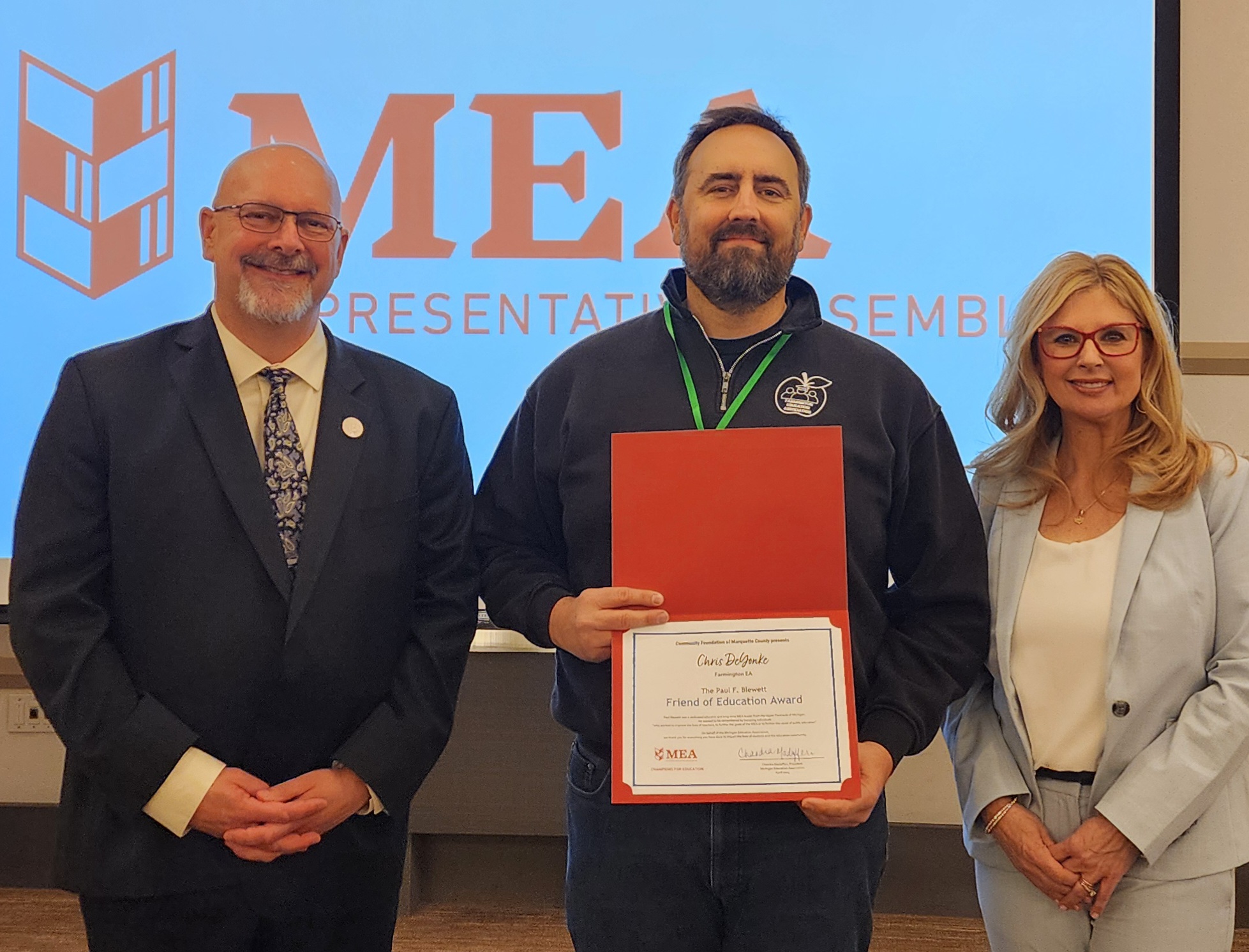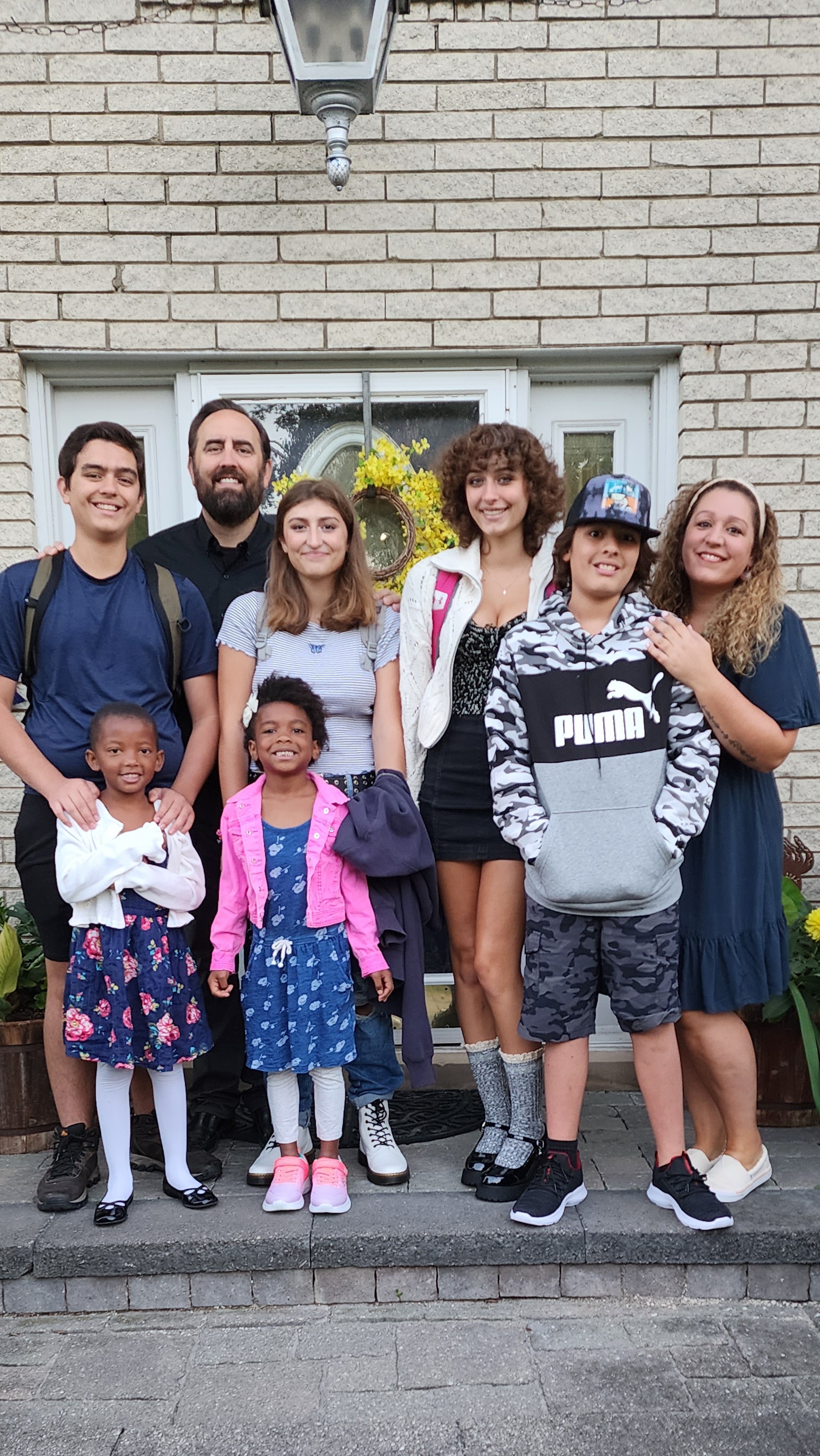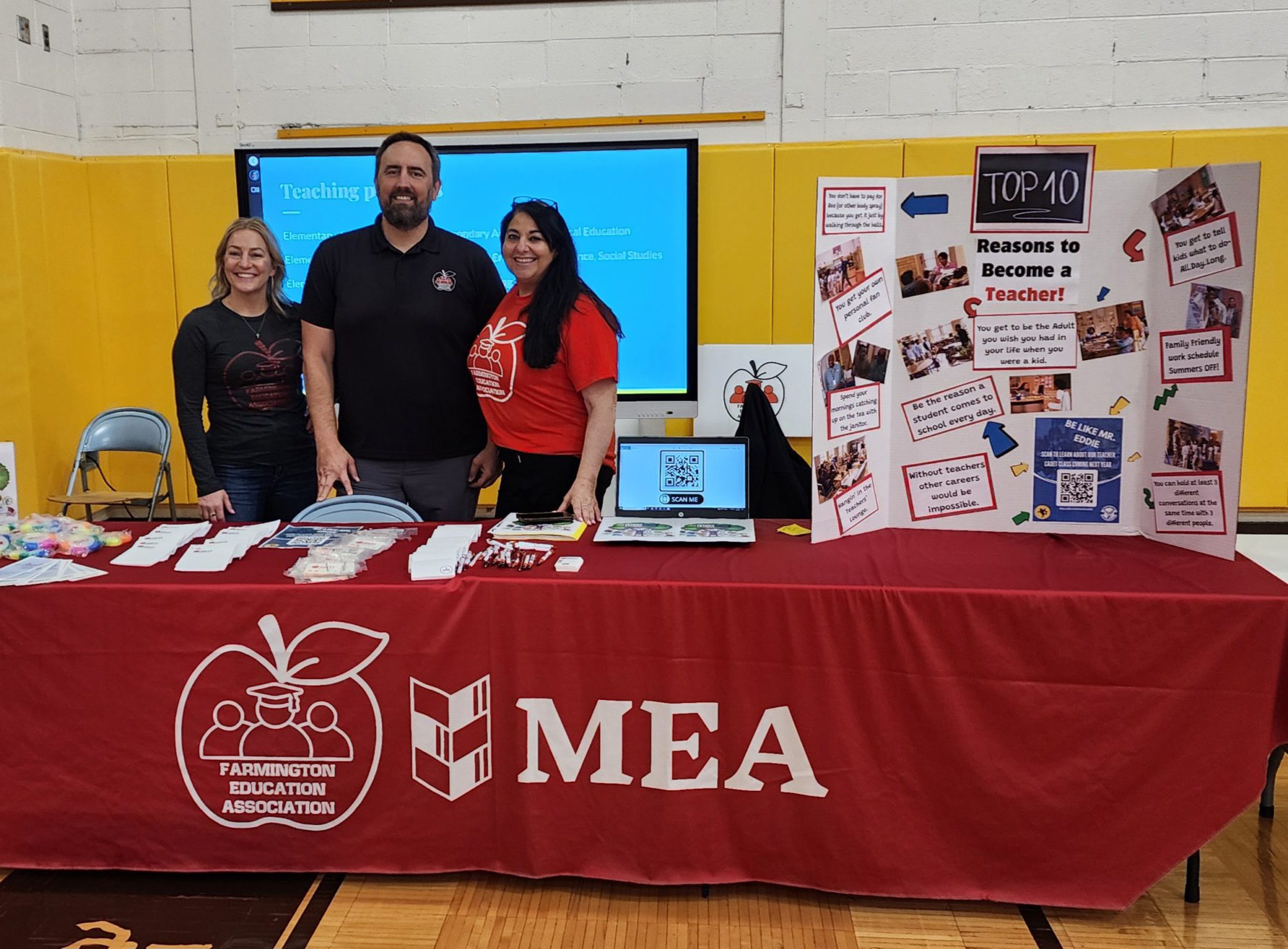Award-winning Farmington union leader shares his ‘why’ – and how
By Brenda Ortega
MEA Voice Editor

A few years into his role as president of the Farmington Education Association (FEA), Chris DeYonke was marking member information in a spreadsheet when he stumbled across a finding: New hires who joined the union remained in the district more often than those who didn’t join.
DeYonke gathered all of the data, and the difference was striking. “When the district hired someone and they didn’t join the union, there was only a 50% chance that they would stay in the district the following year, vs. the new hires who joined the union: We had a 90% retention rate.”
That impressive track record was no fluke, he said, but reflected a planned and concerted effort to bolster membership by listening and delivering. “I feel like we’ve created something where people believe belonging is valuable and they appreciate being part of something bigger.”
For his strong local leadership beginning in COVID’s first year, DeYonke was recently honored with MEA’s Paul Blewett Friend of Education Award. The honor comes with a monetary award endowed through the trust of Blewett, a longtime educator and leader from Region 17 in the U.P.
Working closely with FEA officers and especially with current Vice President Mamie Giller – who was membership chair at the time he was elected in 2020 – DeYonke has presided over a rise in local membership from around 550 to 640 today, an increase from 77% to 91%.
From the start, DeYonke and Giller worked to develop plans for signing up new hires but also to attract opt-outs and bring back former members with lapsed memberships.
“The two of them really took the reins,” said Lori Tunick, the MEA Executive Director who supports the unit. “They went out, no holds barred, and talked to people – encouraging them to join and figuring out how to get them signed up.
“It didn’t happen overnight, but we created a system to begin to build up membership and we brought in training for everyone, including (building) reps,” Tunick said.
A high school special education teacher, DeYonke first meets with newly hired educators at the district’s annual orientation and begins by telling the story of his “why” – why he first got involved with the union, why he served on the bargaining team since 2012, why he ran for president.
“I also tell them my children live here and go to our schools here and how I use that as motivation. I know the better working conditions that we can secure for teachers will create better teaching and learning conditions for my children.”

Both of his parents were teachers who met on the job in Dearborn. His father was local vice president and chief negotiator, a role that meant he often was “doing union work while everyone else was on vacation,” DeYonke said.
His dad sometimes left extra early in the morning for meetings with district officials. His parents attended union events and conferences together. And he enjoyed a middle-class upbringing alongside two brothers.
“From a young age I was able to see what a career could be in public education and also to understand the importance of a union and what it could do for members,” he said.
Today DeYonke and wife Christina Fernandez – a fellow Farmington special education teacher – are parents to seven children, living out their dream of having a large family, he said. His belief in the importance of family inspired him to take on the extra work of union leadership.
“Our love of children has always been at the forefront of our marriage, but over the 2010s our ability to care for our children was significantly compromised by the changes in education and salary freezes flowing out of decisions being made in Lansing.”
He still gets emotional recalling the “seminal moment” that spurred him to join the FEA bargaining team a dozen years ago. “I had a meeting with my son’s chemistry teacher who was a coworker. We were in the midst of all these freezes, and she relayed to me –” he said, pausing to gather himself.
“She relayed to me that her husband was concerned about them having children, because she wasn’t making any money and her salary was continually frozen; and as a father of seven that bothered me deeply. That really started my union activism.”
When he ran for president in October 2020, it was the first contested FEA election in a few decades. About 400 members voted, and afterward the leaders wanted to seize on that momentum, said Giller, who lost in a run-off to DeYonke and stayed on as membership chair.
“We got to work and never looked back,” Giller said.
Now vice president, Giller said she and DeYonke make a good team because they’ve built trust and respect for each other. They compare notes every morning when DeYonke is dropping off his first grader in her classroom. She’s learned good leadership starts with listening.
“Chris is good at knowing his members,” Giller said. “He’s able to get out to buildings, so he’s really visible and approachable. Then he listens to feedback and tries to tackle those concerns.”
DeYonke agreed: Whether or not he can solve every problem, “Most often when I finish talking with someone, they end it by saying, ‘Thanks for listening.’”
DeYonke and Giller have also focused on empowering officers and building reps to have one-on-one conversations with people who were disengaged from the union, including former members.
Their approach was two-fold: to find out why individuals didn’t want to join and to make the case that now was the time – amid pre-vaccine COVID – when the union needed strength in numbers.
“We conveyed that we needed to be united in what we asked for from the district to be able to take care of everyone,” DeYonke said. “We said this was a new beginning and if they had any specific instance or issue that had turned them off from the union to come back and give us a try.”
If prospective members’ complaints could be addressed, they worked on it. If the issue was around a past-due balance, they explained the Commitment to Membership program through which they brought several members back into good standing.
New members immediately received communications from building reps and leaders. For those very resistant to joining, Giller – now vice president who was membership chair at the time – would ask only for information to understand why, she said.
“Every time I would send out a new email I would say, ‘These are the things the union has done for you in the last weeks or months.’ And we would circle back to talk with individuals; for example when we had raises – we came back to say, ‘Two years ago, money was your number-one concern. Since then we’ve been able to cut off three pay steps and put $10,000 in your pocket. How do you feel about joining now?’”
All of the organizing helped FEA speak with a strong voice during COVID, using a coordinated campaign of advocacy to have a say in decision making and secure protections, such as district-paid COVID sick days beyond state mandates.

Last year the union team negotiated its best contract in 40 years, reworking the salary schedule and restoring members frozen on steps in past years. They secured a Letter of Agreement to pay mentors for guiding early career educators and ensure strong supports for those new teachers.
Social events are another value of membership, DeYonke added. In the past couple of years, the union has organized private screenings at a local movie theater, group travel to a Tigers game, and other gatherings “to decompress and enjoy each other’s company.”
As a result, “People feel a sense of belonging and pride,” he said. “There’s security in knowing you have people supporting you, encouraging you, and looking out for you.”
One service that DeYonke provides for members in good standing has proven to be especially meaningful and popular. He sits down with members planning to take a medical or parental leave and helps them navigate confusing rules and forms.
“We’ve created a system with a worksheet we go over that calculates their sick days and their daily rate of pay, and it has a color-coded calendar on the back,” DeYonke said. “We sit down and plot out FMLA (the federal Family Medical Leave Act), when their sick days would run out and when they need to start borrowing days. Plus forms for borrowing days. And it helps put members at ease.”
As the union’s strength became fortified, DeYonke said he shared the 50%-vs.-90% data on new-hire retention with district administrators. Over the past two years, the relationship between the two sides has become more collaborative, leading to improvements in salary and teacher voice.
“We presented that data to the district and said, ‘We can be your partners; we have a vested interest together in attracting and retaining teachers, and bottom line: Teachers who come and join the union feel a value in that and stay more than people who don’t join the union.’”



